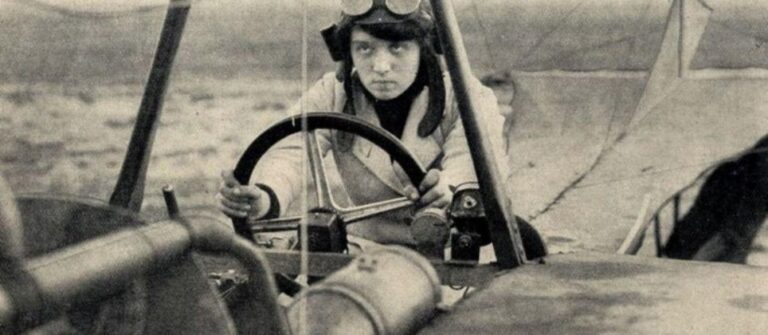IGEL Blog

Yes, to Flying Women
Melli Beese, A Role Model for Women in Technology
IGEL’s Augsburg office moved from Hermanstraße to Melli-Beese-Straße in February 2023. This is a good opportunity to take a closer look at the life of Melli Beese, an unwavering German aviation pioneer, who was born 137 years ago in Dresden.
Role Model for Women in the Technology Industry
The determination and resilience with which Melli Beese succeeded in becoming the first German woman to obtain a pilot’s license makes her a role model for all those who advocate for women in technology.
“Yes to flying women,” is what Amelie Hedwig Boutard-Beese, better known as Melli Beese, said to herself while studying sculpture at the Royal Academy of Liberal Arts in Stockholm from 1906-1909. She read about the Wright brothers’ flying experiences in the newspaper. “Flying. I wanted to learn to fly. But that was also all I knew I wanted,” Melli Beese records in her autobiography. (Tatjana Dietl „Sie wollte fliegen, immer nur fliegen“)
Woman Hood in the Empire Days
Unthinkable for a woman in those days. For her, the role of housewife and mother was intended, admiring her husband and adorning him with her pretty appearance. Women were prevented from competing with men. Academic training was not desired, and certainly not in the technical field. Women on airplanes were not even to be thought of; that could only bring bad luck.
Melli as the first German Pilot
So how did Melli Beese manage, in this environment, to become the first German woman to obtain a pilot’s license on September 13, 1911? What made her so strong to defy the strict social conventions? Even more than 100 years later, female pilots are a rarity: in civil aviation, there are only 2-3% female captains and co-pilots. (Gisela Zimmer „Wer will kann, Teilzeit fliegen) What can women in technological professions learn from Melli Beese and apply in their daily lives and careers? To understand, I will start with a brief outline of her career.
Melli’s Path to Becoming a Pilot
After returning to Dresden from Stockholm as a sculptor, she attended lectures in mathematics, naval architecture, and aeronautical engineering at the Polytechnique in Dresden. At the same time, she was looking for a flight instructor with whom she could learn the practice of flying. After being rejected at three schools, with slogans such as “Women are no good for flying”, she found the flight instructor Robert Thelen in Switzerland, who reluctantly agreed to give her flying lessons.
Flying Lessons at Ad Astra airline and Rumpler Factories
Melli Beese went through a tough school here. Not only because she crashed and injured herself on one of her first flights, but above all because she had to deal with constant sabotage from her male colleagues. They manipulated her flying machines by replacing spark plugs with rusty ones or emptying the fuel tank and loosening wings. In addition, the male colleagues were preferred for flying lessons, often an entire day passed at the airfield without Melli being able to fly at all. In addition, there were verbal attacks, which were a psychological burden. Nevertheless, through a trick, she managed to pass the exam for her pilot’s license in the early hours of the morning on her 25th birthday with witnesses. The Berlin press wrote: “The young candidate, dressed in her flying outfit, boarded the school machine and flew off dashingly … She flew the prescribed test flights in very good style” (Martin Herzog „Melli Beese besteht die Flugprüfung“). She was the 115th person in Germany to obtain a pilot’s license and the first woman. A little later, she took part in a flying competition and set a new altitude and endurance flight world record for female pilots with a passenger. For this, she flew 825 m (about 2706.69 ft) high and stayed in the air for 2.5 hours.
Melli as an Entrepreneur
Melli Beese met her future husband Charles Boutard at the airfield in Berlin Johannisthal. Together with him, she fulfilled a dream. Together, they founded a flying school, based on their own new concepts, and later an aircraft factory. They built aircraft under license and developed new ones, including a flying boat. Between 1912 and 1914, they filed several patents. Their business was flourishing, and they seemed to have made it when the First World War broke out on July 28, 1914, and everything changed.
The war changes everything
Through her marriage to a Frenchman, Melli Beese had obtained French citizenship. With the outbreak of the war, both were considered undesirables in Germany and lost the flight school and the factory in 1915. They were also forbidden to enter the Johannisthal airfield and to do business at all. Their planes broke down and were given to the general population to heat their homes. Finally, the couple was exiled to Wittstock in Prignitz, where they lived in the poorest conditions and fell ill.
After the War
After the war, the two were faced with nothing. “However, we were faced with a shattered life, sick, deprived of all our own resources and possessions – we had literally been ruined” (Melli Beeses „Fliegerleben – Selbstporträt im Telegrammstil“, Berlin 1923). However, it should not be assumed they gave in to defeat. No, on the contrary. They recovered and made new plans. This was anything but easy since they had very few financial resources. They hoped for government compensation payments for the destroyed flight school and the flying machines, but it came only sparingly or not at all and cost a lot of energy. Charles Boutard and Melli Beese planned a flight around the world. This required a renewal of their flying license. During a test flight in Berlin-Staaken, Melli crashed. Although she was not injured, this event made the barrel of defeats overflow. Marital problems, depression, financial worries, and recognition as a woman after the war were even more difficult than before… all this led Melli Beese to commit suicide on December 21, 1925, at the age of only 39. She shot herself with a revolver and left behind the motto: „Volare necesse est, vivere non necesse!“ – „ Flying is necessary, life is not! “
What makes Melli Beese so special, what was her special power?
What is the secret of Melli’s success? Where did she get the strength to achieve the impossible?
She knew what she wanted
She had one goal: “I wanted to learn to fly! – that was also all I knew I wanted…” (Melli Beeses „Fliegerleben – Selbstporträt im Telegrammstil“, Berlin 1923) and she relentlessly followed this goal, despite all obstacles. She was determined.
She was ready to leave her comfort zone
At 20, she left her home country to study sculpture in Stockholm, which she was denied in Dresden. Later, in search of a flight instructor, she moved to Switzerland. She was independent, self-reliant, and strong. To achieve her goals, she was ready to enter unknown terrterritory and break away from family security.
She was extremely interested and talented
To be recognized as a woman, she had to be better than the men. Any small weakness would have been immediately used against her. She could only achieve her position in the male domain because she was incredibly talented in what drove her: curiosity about technology and flying.
She was tough
She has had to put up with a lot of physical and psychological injuries over the years. Plane crashes, bullying, injustice, financial hardship, illness… Time and again she got up and kept going. She was not afraid of death: “For the first time, life and death in her own hands – in immediacy unlike any other sport!” (Tatjana Dietl „Sie wollte fliegen, immer nur fliegen“).
She was smart
Not letting blockades stop you also means finding loopholes, thinking strategically, recognizing opportunities, and taking advantage of them. This was the only way she could get her pilot’s license against the resistance of her fellow pilots. This was the only way she could learn to fly.
She had supporters
On the one hand, there were her parents, who supported Melli’s career ideally and financially.
She had her husband, with whom she built up her company and made future plans, who provided her with emotional support.
When she founded her aviation company, she was financially supported by Karl August Lingner, the inventor of the mouthwash Odol.
Conclusion
Melli had good prerequisites. She was very talented, curious, thirsty for knowledge, and willing to go beyond boundaries and she had important supporters in her close environment. But all that is not enough in a society that excludes certain groups because of their gender, their origin, or for other reasons. It is precisely diversity, versatility, and different perspectives that are important to bring forth innovations and make the world a better place. Let us not give up our talents just because they belong to the wrong group. A society can only reach its full potential if everyone can participate on an equal footing.


